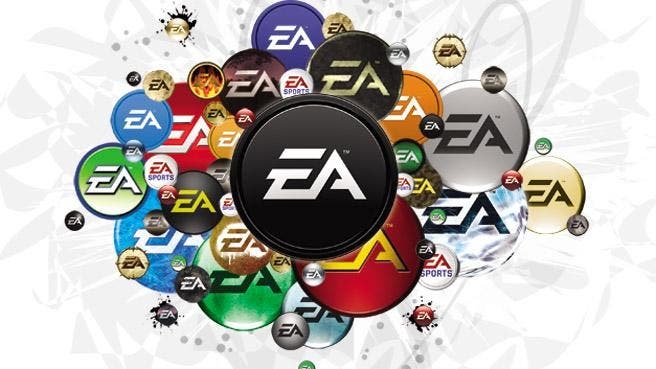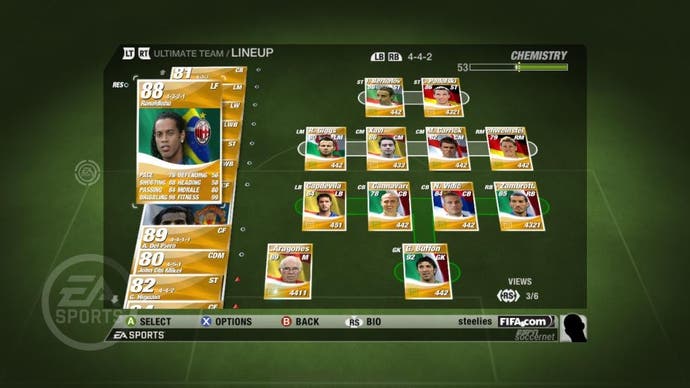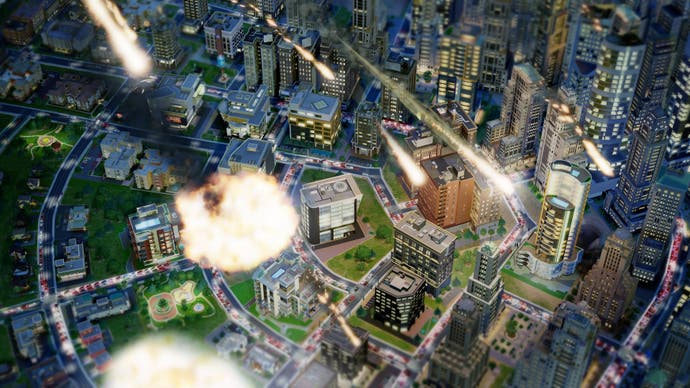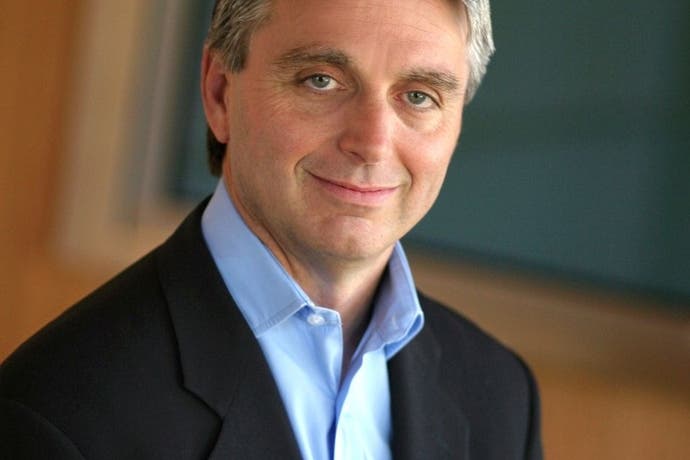So long, John Riccitiello
EA's outgoing CEO has done a lot of things gamers hate, but in a company as large as EA a mixed legacy was probably inevitable.
So then, John Riccitiello will leave his job as CEO of Electronic Arts on 30th March. A wartime president of sorts, Riccitiello had to steer his company through the decline of traditional boxed game sales and the rise of digital games on mobile and social platforms. He had to sacrifice a lot of foot soldiers in order to keep the graphs going up.
Except he didn't keep the graphs going up. "It currently looks like we will come in at the low end of, or slightly below, the financial guidance we issued in January, and we have fallen short of the internal operating plan we set one year ago," he said in his resignation letter. "EA's shareholders and employees expect better and I am accountable for the miss."
So why has he really gone? And how do we grade Riccitiello's time as boss of the company that - by volume - produces more games that core gamers care about than any other in the industry, including Sony, Nintendo, Microsoft, Activision and Ubisoft? Finally, just as importantly, what should we be looking for in his replacement?
The short version of why he's gone is simple: the share price. It may seem insane that it can be that simple, but ascribing sensible human emotions to the stock market is like expecting a falling boulder to burst into song. My favourite example of this is Apple's share price diving 30 per cent after the company only booked $1.3 billion dollars per week profit at the end of last year. The shame! I'm surprised Tim Cook didn't march up Wall Street and ritually disembowel himself with the closing bell.
The slightly longer version of why Riccitiello has gone takes in a lot of different things.
In a big company like EA, the boss works with his or her top managers to make strategic decisions that shape the work done by the tens of thousands of people for whom he or she is responsible. Even massive acquisitions like BioWare and PopCap (well over a billion dollars' worth of outgoings) are generally part of the plan rather than the plan itself. The actual outcomes may take years to make themselves clear.

In Riccitiello's case, when he took EA's top job in 2007 he reshaped the company so that responsibility and autonomy was distributed among individual labels - like EA Games and EA Sports - claiming that this would stop creative people getting bogged down in bureaucracy and allow them to ship games more frequently. That seemed like a good goal, because at that stage it looked like the more stuff EA shipped then the more money it would make.
(It's tempting to say this worked for everyone initially, too, because in 2008 EA shipped Dead Space and Mirror's Edge, and distributed Left 4 Dead in partnership with Valve. But the reality is that those projects probably didn't owe much to strategic changes that would still have been bedding in when those games were in the final stages of production. Anyway, let's not get distracted.)
The stock market likes this sort of thing: change, new stuff, more users; vision. Restructuring with the goal of delivering more good games and therefore more headline revenue growth is the sort of thing that massages their confidence levels. We're haemorrhaging money at the same time? Don't pay too much attention to that. Look over here! Strategy!
"What about the successes? Things like FIFA? And Battlefield? Don't care. That's not new. That's not interesting. Sell sell sell. Yours, the shareholders."
Meanwhile, though, big changes were going on out in the market. The global economic crisis didn't help, but it also became apparent that EA would need to adapt fast to avoid being left behind in new digital categories that firms like Zynga and Valve were exploiting more effectively. This led to some eye-catching acquisitions, like Playfish for $275m in late 2009, against a backdrop of sizable reductions in the company's overall workforce.
Reading between the lines of several years of financial reports, game releases and strategy pivots, the fact that EA didn't really spot the rising tide of digital content in time feels like one of the biggest reasons Riccitiello is heading out the door, which is a bit unfair because it's not entirely his fault. Much of the stuff EA has been doing as a company since 2008 has been catching up with a trend his predecessor didn't see coming, and he did a lot of interesting stuff to respond to that situation.
Star Wars: The Old Republic was undoubtedly important too - perhaps the single most important game of his tenure. It was a high-profile and failed attempt to woo shareholders by going directly for Activision's World of Warcraft-shaped jugular. To compound the misery of that failure, Activision barely batted an eyelid and spent its time establishing a viable new product empire called Skylanders instead.

What about the successes? Things like FIFA - now pretty much the biggest-selling game in the entire world, with a thriving digital economy layered on top of it? And Battlefield - now the best modern warfare game of this generation, transformed from a niche PC product into a global blockbuster and a beacon of future next-gen success? Don't care. That's not new. That's not interesting. Sell sell sell. Yours, the shareholders.
Ignore them, though, and how has Riccitiello done in the eyes of the people who actually buy the stuff EA makes? You know, us?
The big question for me is whether he kept his eye on the ball with product quality and customer satisfaction. Those are the two things that are generally furthest away from the concerns of the stock market Riccitiello's role exists to satisfy, but they are the things we all burn down the internet arguing about because they matter the most to us.
In pure business terms, the clamour to be more relevant in digital sales led to the emergence of Origin - EA's brute-force attempt to claw some market share away from Valve - and Project Ten Dollar, the system of charging second-hand buyers $10 to unlock multiplayer features in games where the pack-in code for accessing them had been redeemed by the previous owner. This also led to the now-ubiquitous Online Pass and all sorts of digital content that stretched the bounds of respectability by asking for extra cash from people who had just parted with $50.
This stuff was wildly unpopular with you and I - and fairly so. All of this stuff you can euphemistically bundle together as "new business models" is a bit like organised religion: if people use it for good things, like healing and spreading happiness, then there's nothing to complain about. But when it goes the other way, it's toxic.
As I've argued before, though, this isn't entirely EA's fault. There haven't been any new platforms in what was its core console business, and the creative potential of the existing ones appears to have been tapped out in many respects, leaving little room for innovation outside the business model itself. The relationship between the platform holders and major third parties is at its most productive and successful when it's symbiotic on creative and commercial levels, but the former has fallen away a little.
Even so, in pure game terms it would be easy to look at very recent history, pick a bunch of things you don't appreciate, and say Riccitiello could have done a stronger job of installing inspirational and well-balanced creative leadership at the various labels and big studios he oversaw. How else, the straw man argues, do you explain Dead Space 3 micro-transactions, Medal of Honor: Warfighter, SimCity or whatever your favourite EA pet hate is?

Except, look closely at more than just the last 18 months and you see that EA actually does have some pretty decent people in leadership positions. Not all of them were picked by Riccitiello, but many of them worked under him for several years. During that time, EA Canada turned FIFA into the best football game on the planet and it did so pretty responsibly, expanding the game to include a huge range of excellent new game modes, and even using micro-transactions in Ultimate Team in a way most people don't mind. DICE turned Battlefield into one of EA's most important games. BioWare made some mistakes, but are we really damning the whole of Mass Effect and Dragon Age on that account? And isn't every Criterion game brilliant? Riccitiello was also stocking up for the future, famously luring the creative leads of the Modern Warfare series to EA by hooking up with Respawn.
Ultimately, the boss is responsible for the way his or her employees behave, so he or she tries to instil a sensible set of values into those employees - partly through public rhetoric but mostly by example. Only John Riccitiello knows what kind of behaviour he wanted to see and whether the people who worked for him and alongside him embodied what he wanted, but a broad assessment of everything his company did between 2007 and 2013 suggests that not everything got through, whatever his intent may have been, because things have been so mixed.
So how do we grade Riccitiello based on all that? On balance, we probably say that he's only human. To pick just one example, a lot of very smart people missed the boat on digital stuff. One of the only people who didn't was Zynga CEO Mark Pincus. I think we're all pretty happy that John Riccitiello isn't more like Mark Pincus, right? Right.
A few weeks ago I wrote that abusive micro-transactions and an absence of inspirational game design showed that EA was losing its way creatively. On reflection, maybe the truth is that EA is so big and does so many things that you can find a selection of things to support the argument either way. After all, as Randy Pitchford will be able to tell you after shipping Duke (boo!), Borderlands 2 (yay!) and Aliens (boo!), you're only as good as your last hit. When you ship so much stuff, a purple patch can seem positively iridescent, and a few successive blips can seem like a creative crisis.
As for the future, I think we just have to hope that whoever EA installs as its new CEO is someone who believes that creativity and innovation are vital to long-term company value, and not just someone who is dropped in to rebound the share price.
In the abstract world John Riccitiello inhabits - at least for the next 11 days - those are rare qualities, but they would be nice to see.



-3-31-23-screenshot.png?width=291&height=164&fit=crop&quality=80&format=jpg&auto=webp)





